Posts in Category: Events
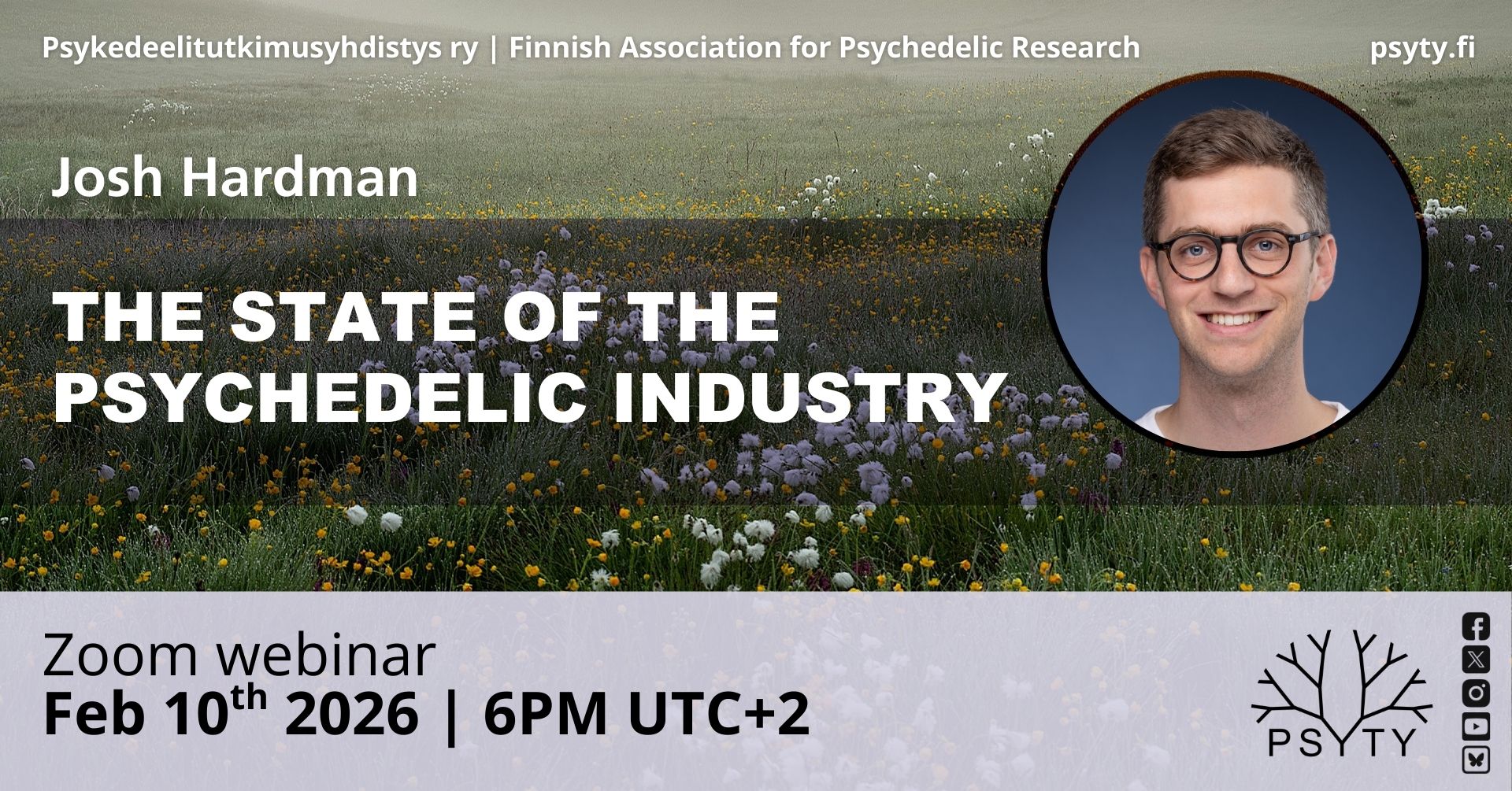
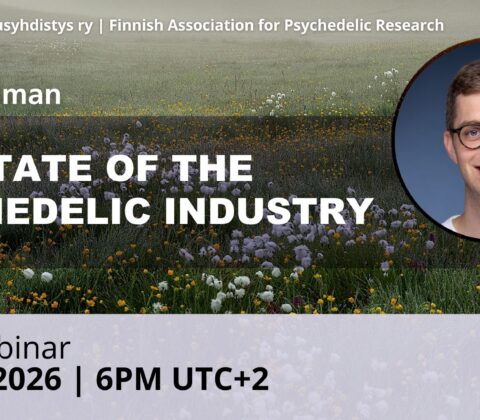
Josh Hardman – The State of the Psychedelic Industry | Webinar February 10th 2026
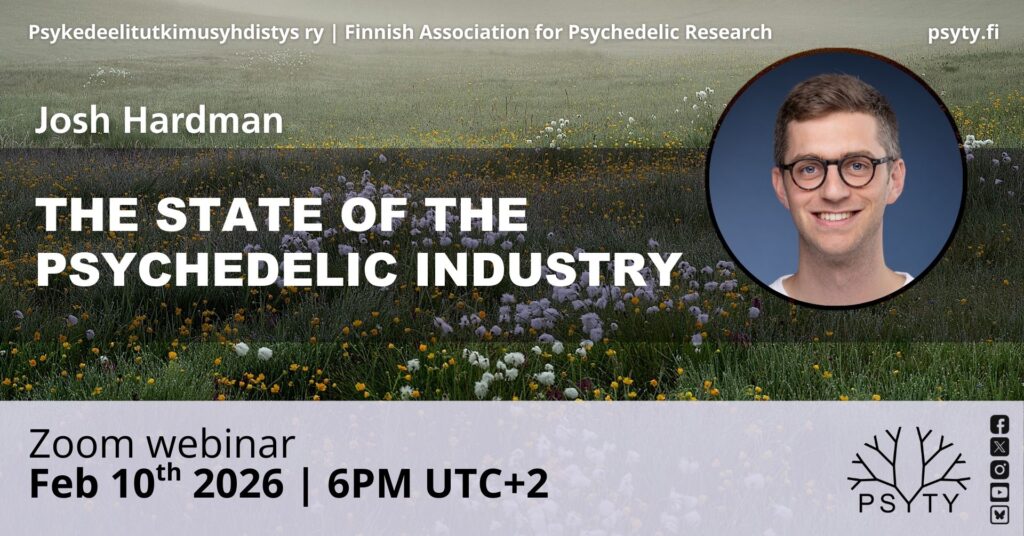
In 2024, there were high expectations that MDMA-assisted therapy would be approved as an official treatment for post-traumatic stress disorder in the United States, and soon thereafter in Europe. However, the FDA rejected the application. While the study sponsor, Lykos Therapeutics, plans to try again with a new application, several other regulatory approval processes related to the clinical use of psychedelics are also simultaneously underway. Some of these are expected to reach approval as early as this year.
One of the central actors tracking research projects, regulatory processes, commercial activities and patents is analyst Josh Hardman, Founder and Editor of Psychedelic Alpha. On February 10th, in a webinar session organized by the Finnish Association for Psychedelic Research, Hardman provides an update on the current state of the psychedelic medicines field. Drawing on his work tracking psychedelic drug development and policy globally, Hardman surveys recent investment trends, the clinical pipeline and trends therein, lobbying activity and political realities, public perception, and international access models. The talk situates U.S. developments alongside international case studies from Australia, Czechia, Germany, Norway, and Canada, offering a comparative view of how different regulatory and access pathways are unfolding.
As well as providing a kind of ‘state of the union’, this talk also focuses on unresolved questions and ethical considerations shaping the field’s future. These include issues around access and equity, commercial incentives, and the tension between medicalisation and broader reform efforts.
The webinar will take place on Tuesday February 10th at 6PM UTC+2. The event contains a Q&A section and the total length is 2 hours.
We offer this webinar as a pay what you can event: you can participate without paying, but by paying, you can help us produce more events like this and ensure that we can keep offering them to people regardless of their financial circumstances.
0 € – register here
5–20 € – buy ticket here
If you pay for the ticket, please also remember to register for the webinar via the registration link!
You can also support us by paying our membership fee for 2026. You’ll find our membership products on the main page of our web store. We also accept donations.
About the speaker:
In 2020, Josh Hardman founded Psychedelic Alpha to track developments in the psychedelic medicine field. Since then, he has authored hundreds of analyses of matters related to psychedelic medicine, including drug development milestones, policy reforms, and research findings. He has presented on psychedelic medicine at conferences around the world, and acted as an expert to bodies including UK Parliament and the United States Department of Health and Human Services.
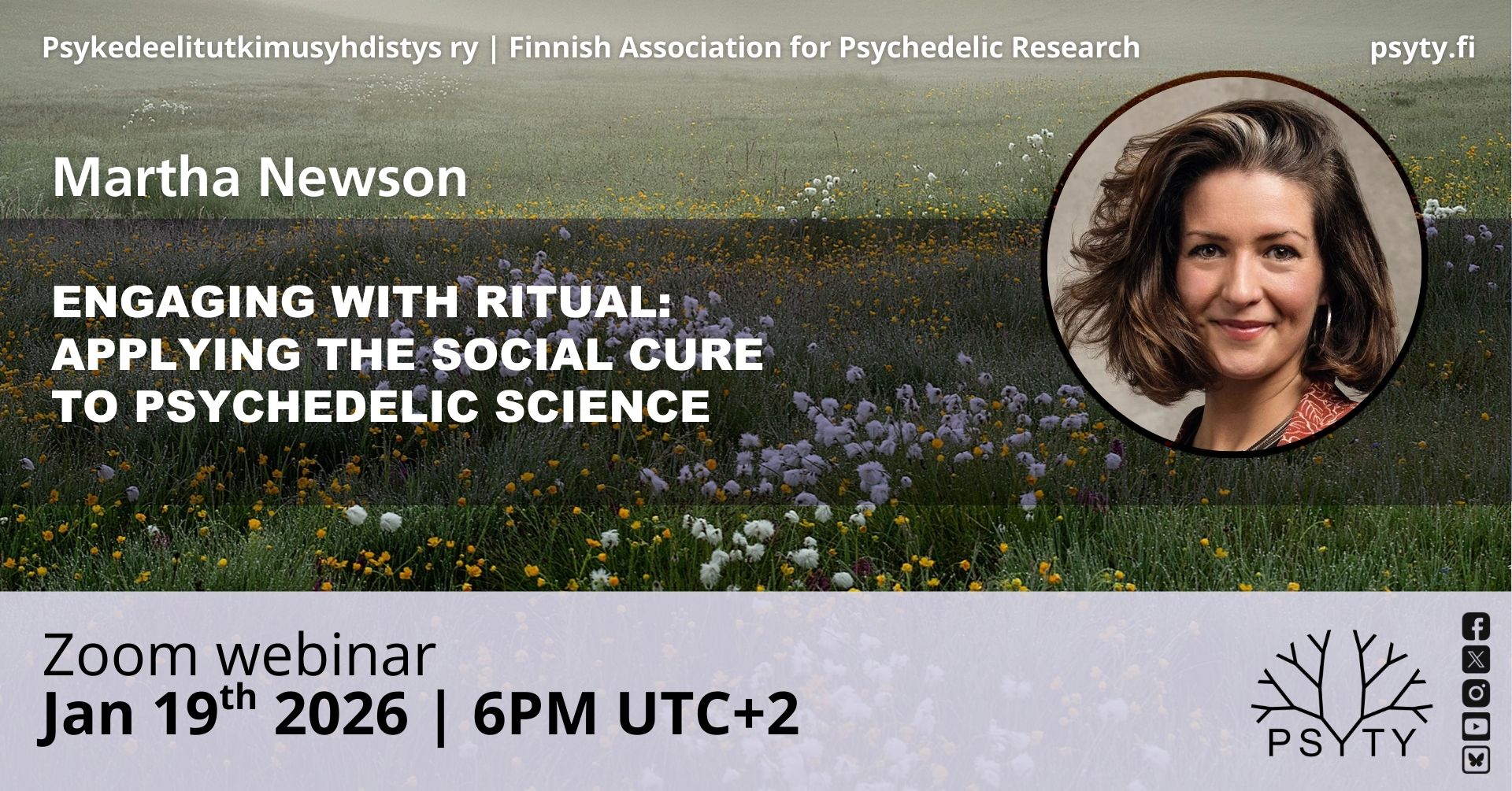
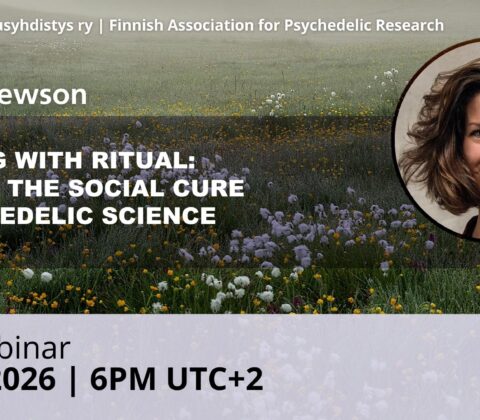
Martha Newson – Engaging with ritual: applying the social cure to psychedelic science | Webinar January 19th 2026
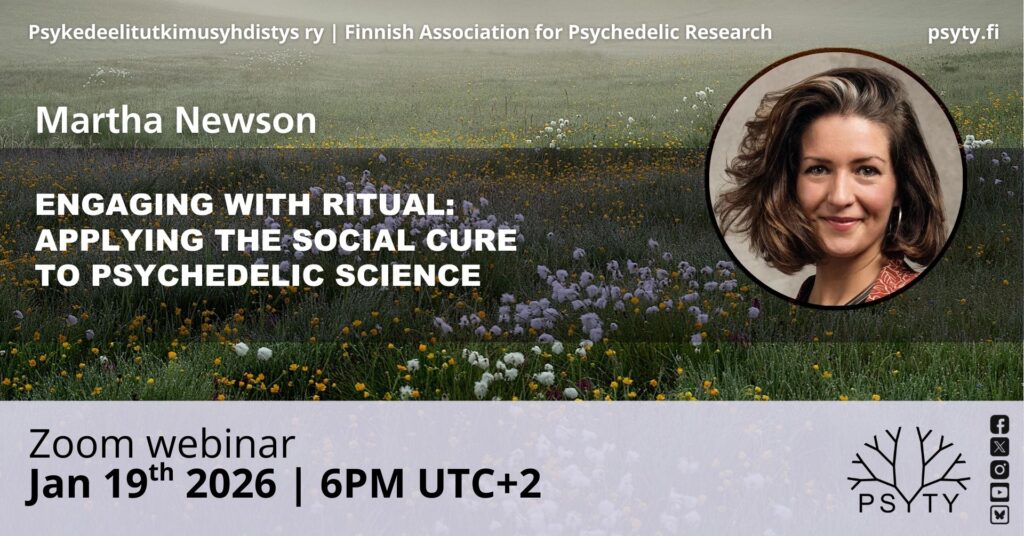
Much of the current discourse surrounding psychedelic drugs and their therapeutic uses revolves around treating single individuals in clinical settings. However, much of both traditional and contemporary psychedelic use has happened in group settings. How do social elements affect the course and long-term effects of psychedelics experiences? In a webinar lecture organized by the Finnish Association for Psychedelic Research this January, we’ll take a look at this question.
Dr Martha Newson brings together social psychology, anthropology, and psychedelic science to explore how a sense of belonging is pivotal in enhancing therapeutic psychedelic experiences. Having conducted fieldwork with diverse populations—from football gangs in Brazil to European sauna communities and raving culture—she examines how ritual can foster profound social bonding. Her first psychedelic-adjacent study, a retrospective cross-sectional survey of rave and free-party events, showed that the “4Ds” (drums, dance, drugs, and sleep deprivation) elicited awe, feelings of personal transformation, and long-term fusion of self with group—a psychological mechanism in turn associated with cooperation.
Building on this, Newson and her associates have introduced a theoretical underpinning for social connection in psychedelic research. The intention is to address a critical gap in current clinical models, which often treat psychedelic therapy as an individual intervention, despite evidence that social relationships are central to mental health recovery and indigenous knowledge about group-oriented psychedelic practices. She argues that preparation and integration groups, as well as treatment itself, can draw vital lessons from recreational and Indigenous use, where identity change is held, witnessed, and reinforced socially. Newson will also reflect on the practical and ethical challenges of researching these experiences.
The webinar will take place on Monday January 19th 2026 at 6PM UTC+2. The event contains a Q&A section. Please note that the event is shorter than usual, with a total length of an hour.
We offer this webinar as a pay what you can event: you can participate without paying, but by paying, you can help us produce more events like this and ensure that we can keep offering them to people regardless of their financial circumstances.
0 € – register here
5–20 € – buy ticket here
If you pay for the ticket, please also remember to register for the webinar via the registration link!
You can also support us by paying our membership fee for 2025. You’ll find our membership products on the main page of our web store. We also accept donations.
About the speaker:
Dr Martha Newson is an internationally recognised expert on belonging and the rituals that bind us—core themes that underpin both her award-winning academic research and her high-impact consultancy practice. She has worked with clients including the Premier League, Guinness, and Hyundai, and has advised on identity and group behaviour in settings as diverse as British prisons, global charities, and major brands. Martha is known for her engaging, thought-provoking talks delivered to audiences around the world—from corporate boardrooms to grassroots communities. Her leadership coaching practice draws on deep, cross-sectoral experience to support leaders in transforming complex challenges and realising their full potential.
Martha’s research spans four continents and has taken her from Brazilian football hooligans to Indonesian fundamentalist groups and the UK’s underground rave scene. During the COVID-19 pandemic, she led global studies on social contact and wellbeing, involving over 10,000 participants across 122 countries. Currently, Martha leads research with the UK’s Ministry of Justice and major football clubs to explore how strong group identities—like those formed around football—can be used to improve behaviour in prisons and reduce reoffending. Her work has been widely featured in the media, including on the BBC, Sky TV, Discovery Channel, BBC Radio 4, and the World Service. Martha holds a prestigious £1.5 million UKRI Future Leaders Fellowship and is Associate Professor of Psychology at the University of Greenwich. She is also a Research Affiliate at the University of Oxford, where she earned her master’s and doctorate in cognitive anthropology and now leads the Changing Lives Lab.
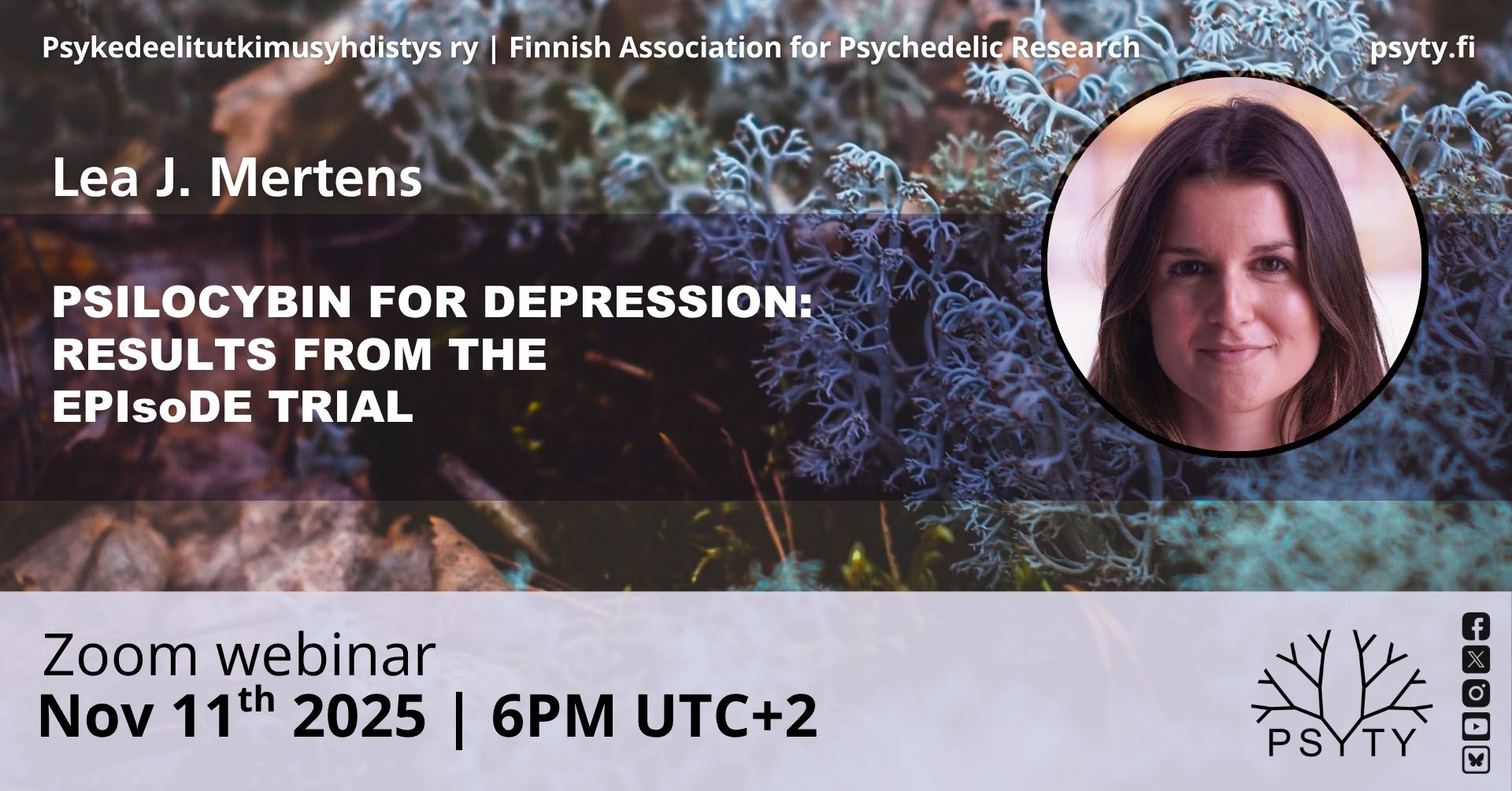
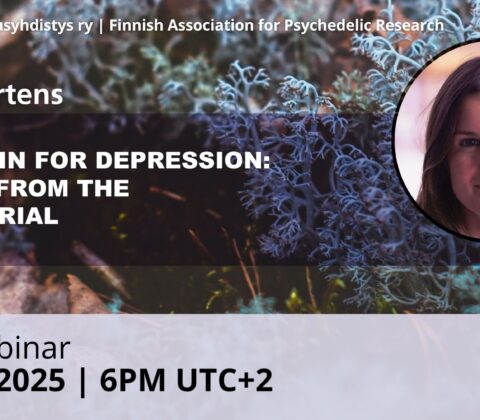
Lea J. Mertens: Psilocybin for depression – Results from the EPIsoDE Trial | Webinar November 11th 2025
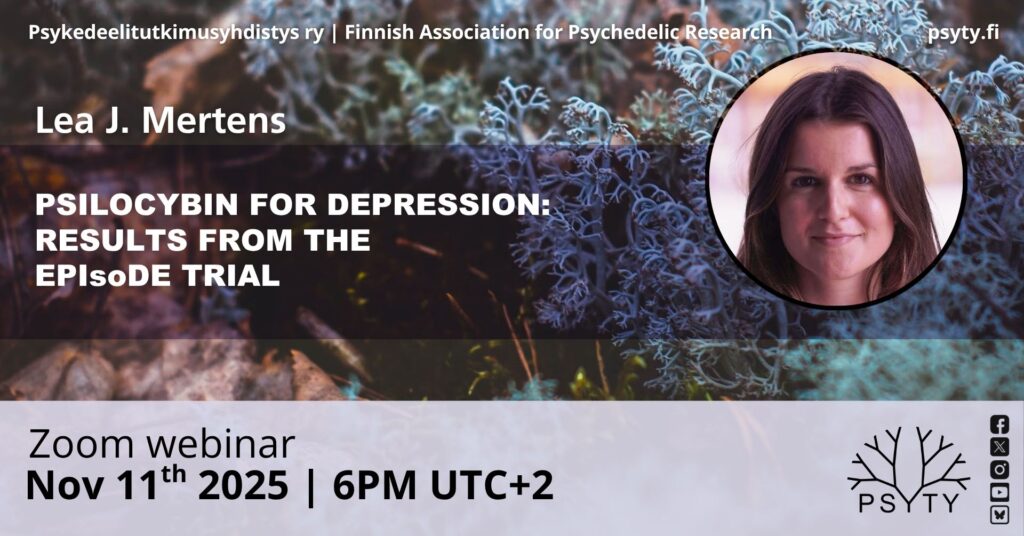
Psilocybin is rigorously researched in the treatment of depressive disorders, including treatment-resistant depression. There are currently phase 3 trials ongoing, and it could be the first psychedelic to be approved for medical use by the FDA and EMA.
In the next webinar organized by the Finnish Association for Psychedelic Research, PhD researcher and psychotherapist Lea J. Mertens will discuss the EPIsoDE Trial, an academic phase 2b trial that was conducted between June 2021 and December 2023 at two German university hospitals. The study investigated the safety and efficacy of 25 mg psilocybin in comparison to an active placebo (nicotinamide) and a low-dose (5 mg) psilocybin. With 144 patients, the study ranks among the largest clinical psychedelic trials to date.
The talk will describe the study and address the special features of the study design, its rationale and the key study results. Lea will also talk about her personal experiences as a study therapist, and discuss open research questions for subsequent trials.
The webinar will take place on Tuesday November 11th at 6PM UTC+2. The event contains a Q&A section and the total length is 2 hours.
We offer this webinar as a pay what you can event: you can participate without paying, but by paying, you can help us produce more events like this and ensure that we can keep offering them to people regardless of their financial circumstances.
0 € – register here
5–20 € – buy ticket here
If you pay for the ticket, please also remember to register for the webinar via the registration link!
You can also support us by paying our membership fee for 2025. You’ll find our membership products on the main page of our web store. We also accept donations.
About the speaker:
Lea J. Mertens, M.Sc., is a research associate and PhD candidate in the Department of Molecular Neuroimaging at the Central Institute of Mental Health (CIMH) and a licensed psychotherapist („Psychologische Psychotherapeutin“). As part of her research activities at the CIMH since 2018, she has been working as a lead scientist and therapist in the EPIsoDE study.
Prior to this, she completed her Research M.Sc. in Cognitive and Clinical Neuroscience with a focus on neuropsychology at Maastricht University and her B.Sc. in Psychology at Leiden University. Among others, she gained relevant research experience at the Centre for Psychedelic Research at Imperial College London under the supervision of Dr. Robin Carhart-Haris. Her scientific interests lie at the intersection of clinical psychology, psychopharmacology, and psychotherapeutic mechanisms. She has contributed to several scientific publications – read more here.
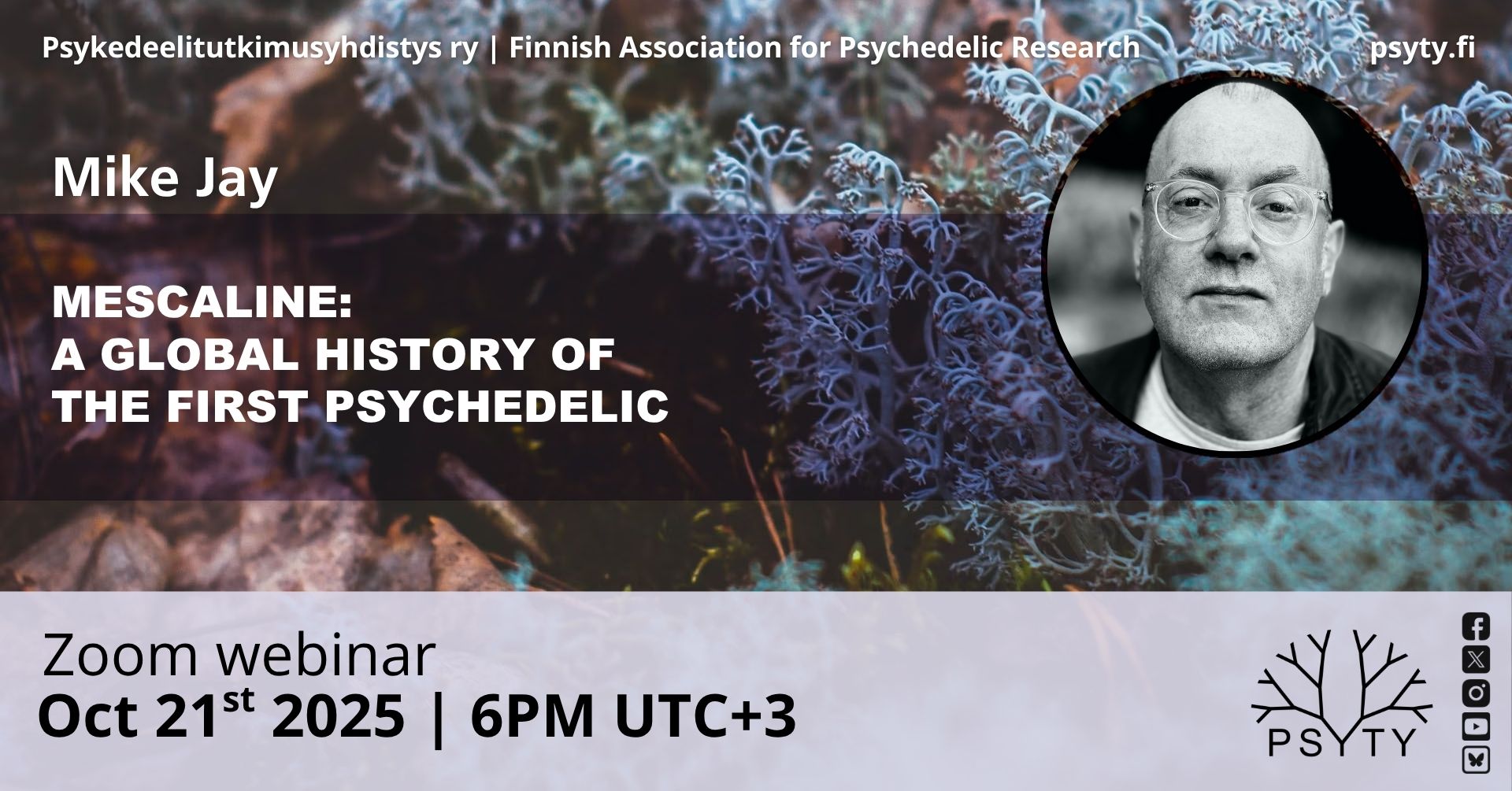
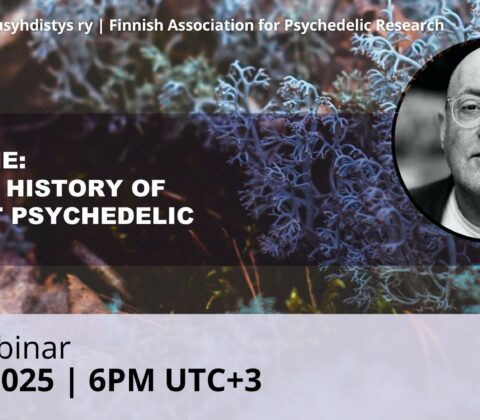
Mike Jay: Mescaline – A Global History of the First Psychedelic | Webinar October 21st 2025
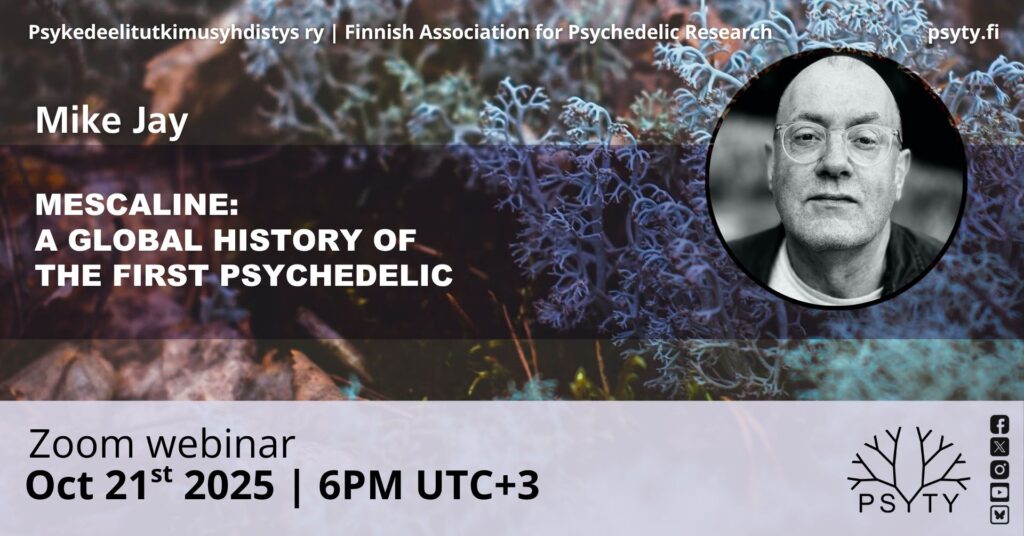
Mescaline can be considered the original psychedelic: Humphry Osmond and Aldous Huxley coined the term, meaning “mind (or soul) manifesting”, after Huxley’s celebrated experience with it in 1953. But it had many previous lives before the psychedelic era. It was first investigated by western scientists, anthropologists and artists as early as the nineteenth century. By the 1920s its visual hallucinations were being widely studied by psychologists, neurologists and philosophers. Before all this, its natural sources, the peyote and San Pedro cacti, had been used in medical and ritual contexts for millennia in the deserts of Mexico, the Andes mountains and the Pacific coast of South America.
In a webinar lecture organized on Tuesday October 21st, we’ll be led into the mysteries of mescaline by cultural historian Mike Jay. Using rarely seen images, Mike will follow mescaline’s journey from the ancient temple sites of Peru to prehispanic Mexico, the first European encounters to its adoption as a sacrament by the Plains tribes of the southern USA, its discovery by modern science and subsequent eclipse by LSD and other psychedelics in the 1960s, and the resurgence of the mescaline-containing cacti in the twenty-first century.
The webinar will take place on Tuesday October 7th at 6PM UTC+3. The event contains a Q&A section and the total length is 2 hours.
We offer this webinar as a pay what you can event: you can participate without paying, but by paying, you can help us produce more events like this and ensure that we can keep offering them to people regardless of their financial circumstances.
0 € – register here
5–20 € – buy ticket here
If you pay for the ticket, please also remember to register for the webinar via the registration link!
You can also support us by paying our membership fee for 2025. You’ll find our membership products on the main page of our web store. We also accept donations.
About the speaker:
Mike Jay is an author and cultural historian who has written widely on science, medicine and consciousness. His books on the history of psychoactive drugs include High Society: Mind-Altering Drugs in History and Culture (2010), Mescaline: A Global History of the First Psychedelic (2019), and Psychonauts: Drugs and the Making of the Modern Mind (2023).
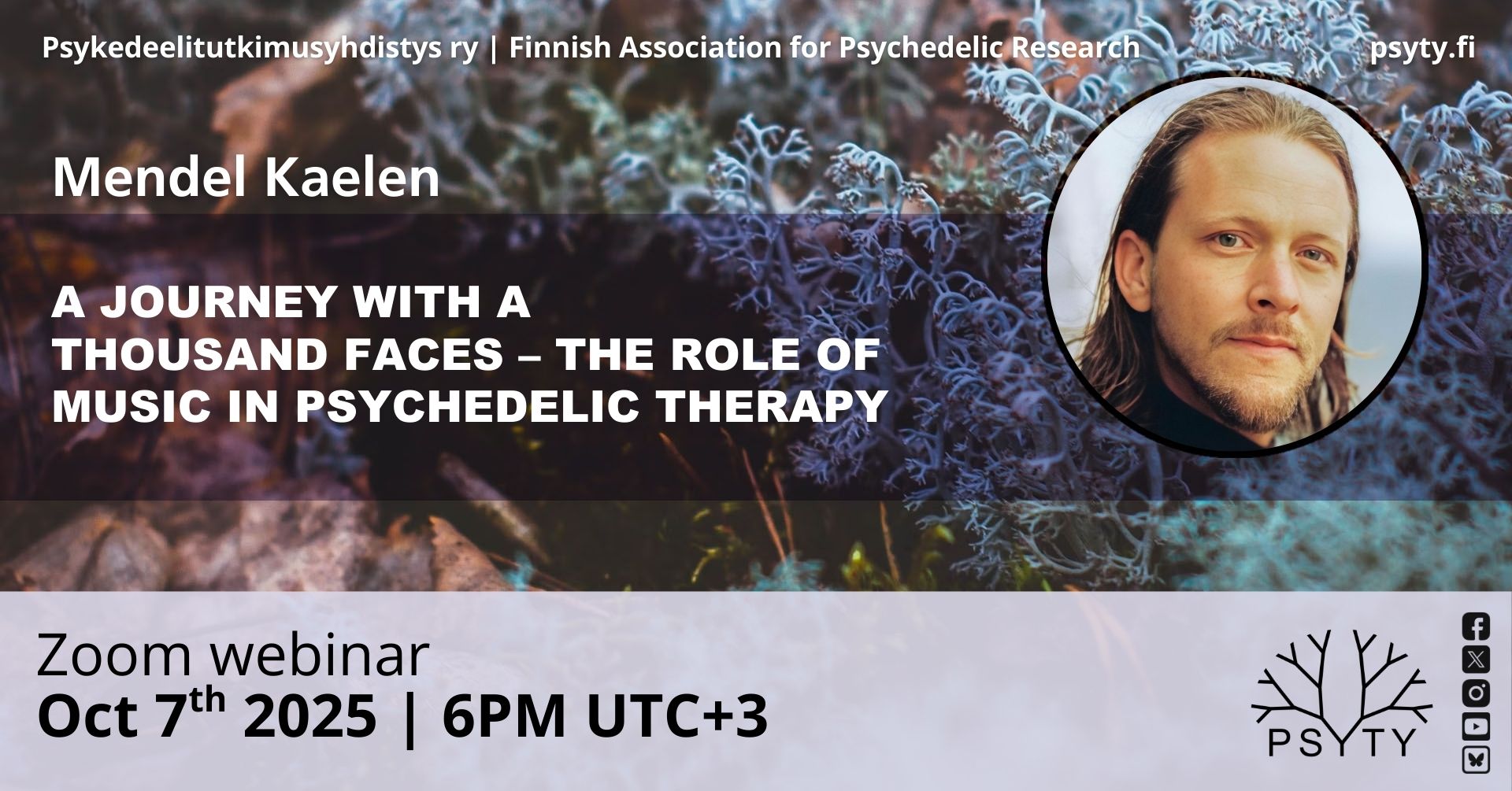
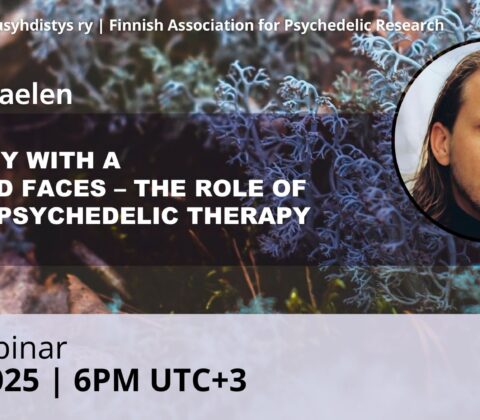
Mendel Kaelen: A Journey With A Thousand Faces – Music In Psychedelic Therapy | Webinar October 7th 2025
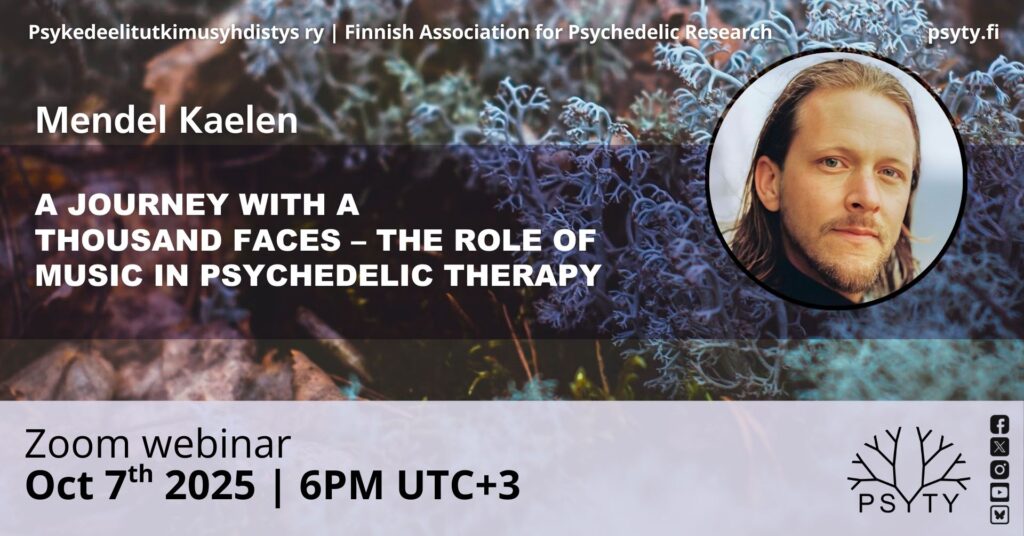
Why can the same piece of music wrap one listener in love and safety, while leaving another feeling terrified and disoriented? We’ll take a look at this question with neuroscientist and musician Mendel Kaelen. Held on October 7th, this webinar lecture introduces an integrative perspective on the therapeutic use of music in psychedelic-assisted therapy. In drawing on insights from neuroscience, human development, evolutionary and psychodynamic theory, it aims to shed light on how the ambiguous dimensions of music can be understood and harnessed in clinical practice.
The webinar will take place on Tuesday October 7th at 6PM UTC+3. The event contains a Q&A section and the total length is 2 hours.
We offer this webinar as a pay what you can event: you can participate without paying, but by paying, you can help us produce more events like this and ensure that we can keep offering them to people regardless of their financial circumstances.
0 € – register here
5–20 € – buy ticket here
If you pay for the ticket, please also remember to register for the webinar via the registration link!
You can also support us by paying our membership fee for 2025. You’ll find our membership products on the main page of our web store. We also accept donations.
About the speaker:
Mendel Kaelen is a neuroscientist and creator working at the crossroads of consciousness, music and psychotherapy. He earned a PhD in at Imperial College London where since 2011 his research focussed on the therapeutic potential of music in psychedelic therapy. He is considered a thought leader on the therapeutic use of music and writes, teaches and speaks frequently on this topic.
In 2019 Mendel founded Wavepaths to develop technologies and methodologies that enable the creation of immersive, flexible musical environments designed to support mental health, therapeutic work and altered states of consciousness. Mendel also collaborates with clinical sites across the EU, USA and Canada, including hospitals and hospices, to optimize patient experiences through sound. In the period 2007-2012, Mendel created numerous sound installations and music records. In October 2025, he will release his album Fertile Voids, marking a return to publicising his music.
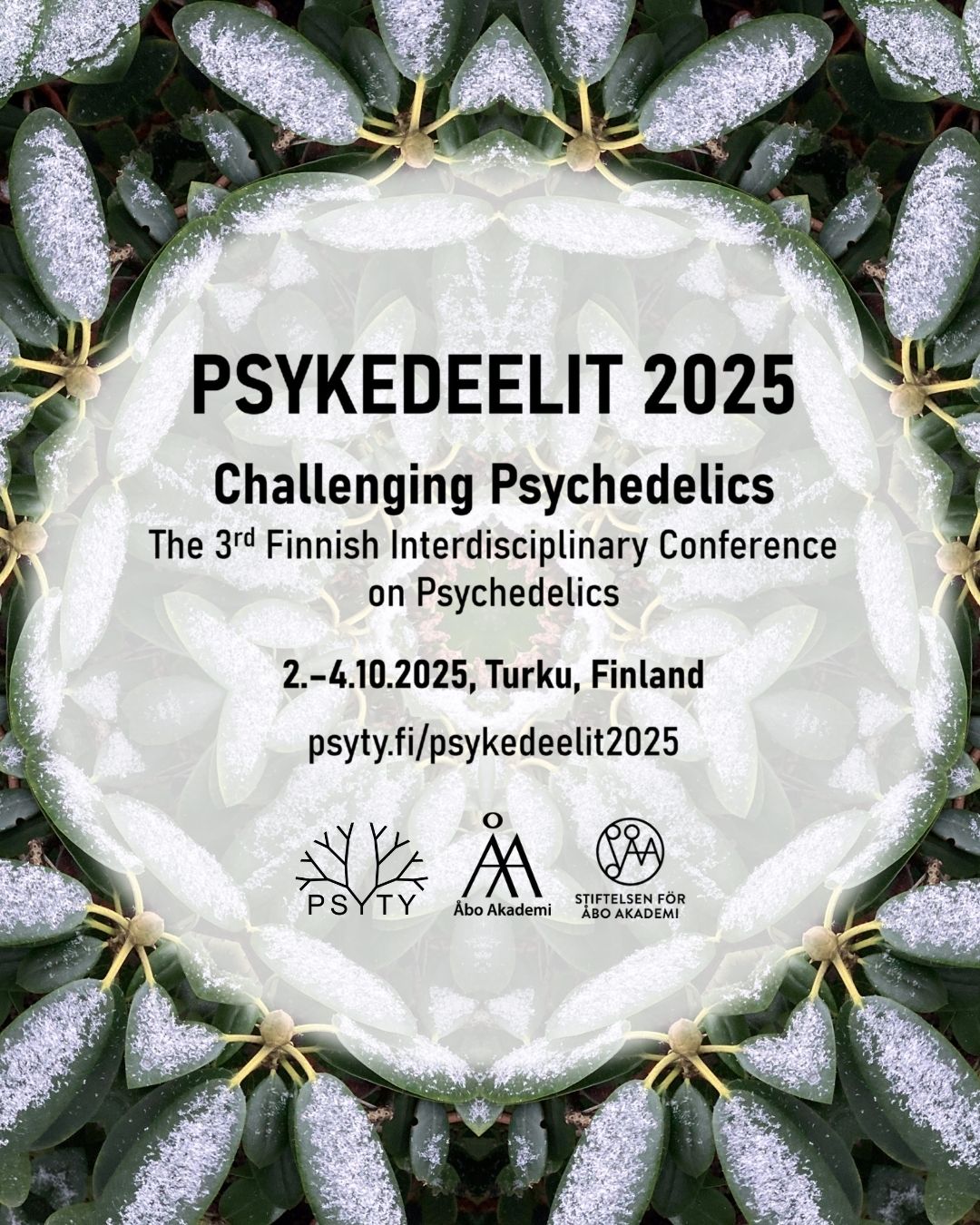
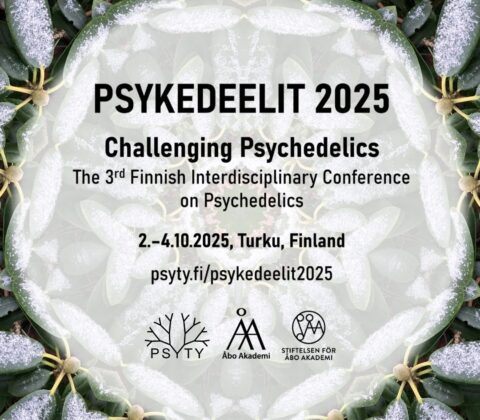
The Psykedeelit 2025 conference – Register now to secure your seat!
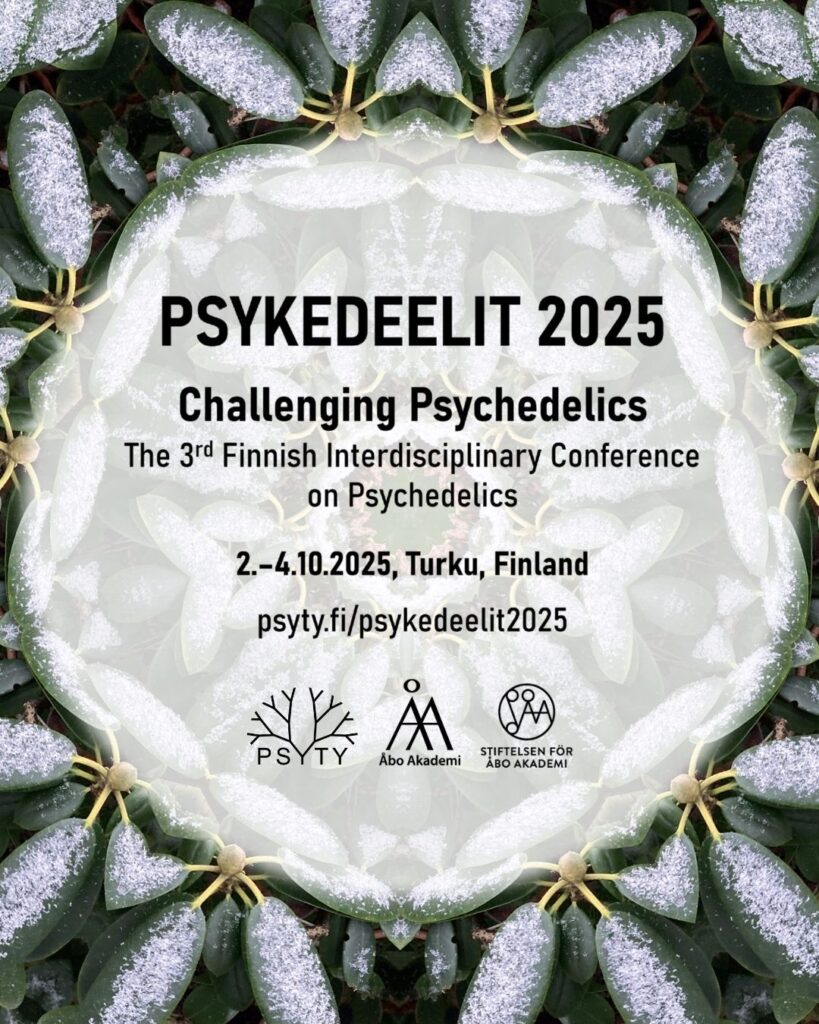
Registration for our Psykedeelit 2025 conference taking place on October 2–4 is now open! Seats are limited, and more than half of them are already reserved, so ensure your place by registering in Psyty’s web store.
The scientific and social programs of the conference and more information are available at the conference page.
The registration fee is 65/40 €. Members who have paid Psyty’s membership for 2025 get a 10 € discount – we’ll email a discount code to members.
More information about the conference here.
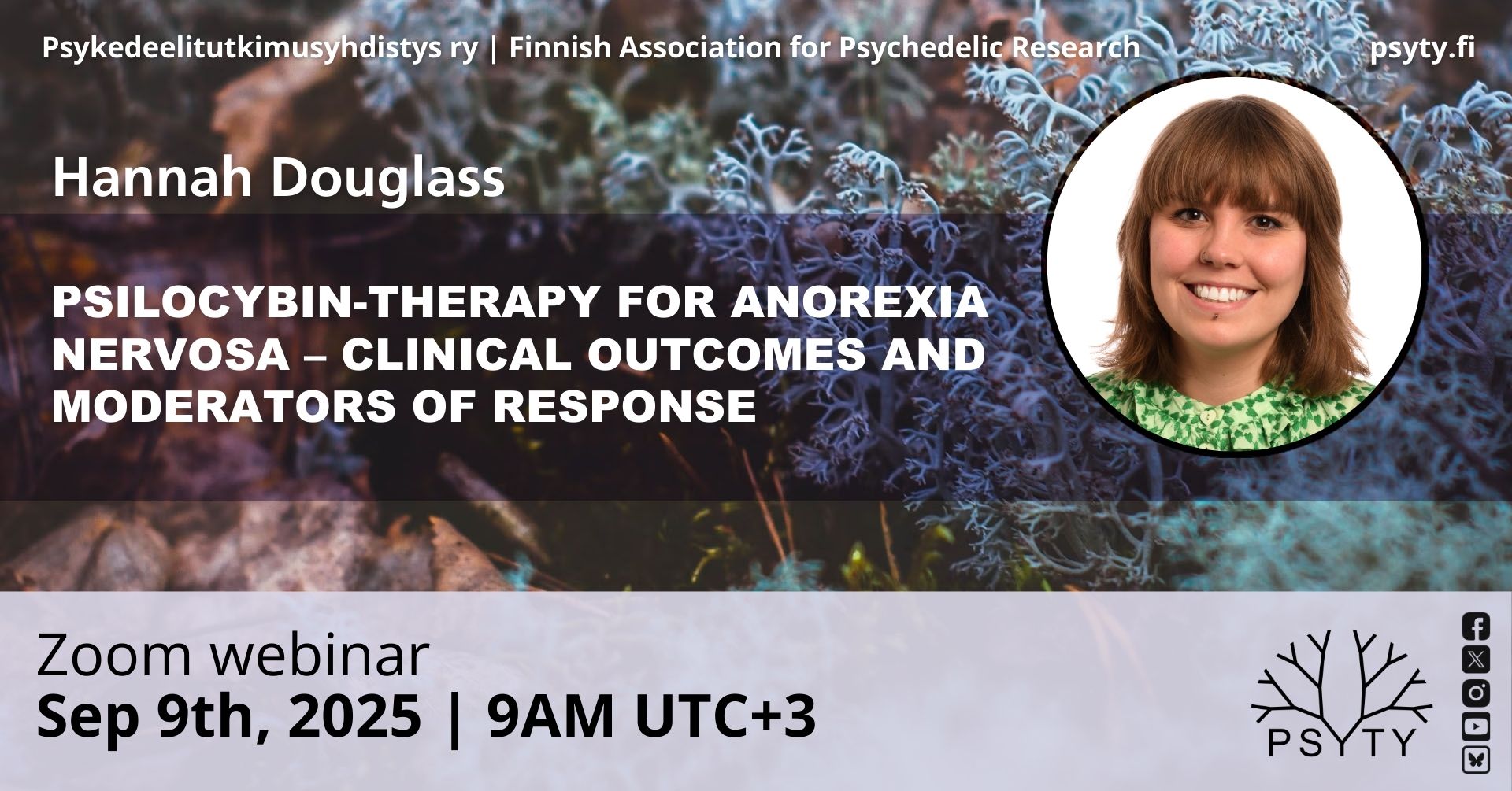
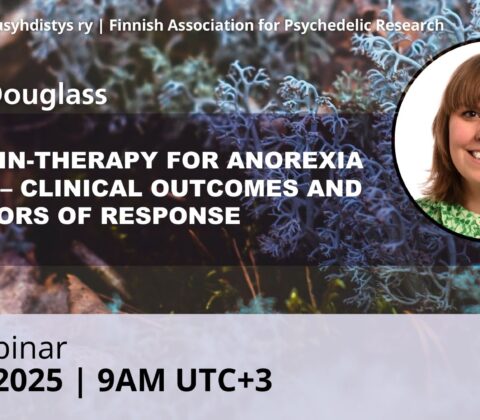
Webinar September 9th 2025 Hannah Douglass: Psilocybin-Therapy for Anorexia Nervosa – Clinical Outcomes and Moderators of Response
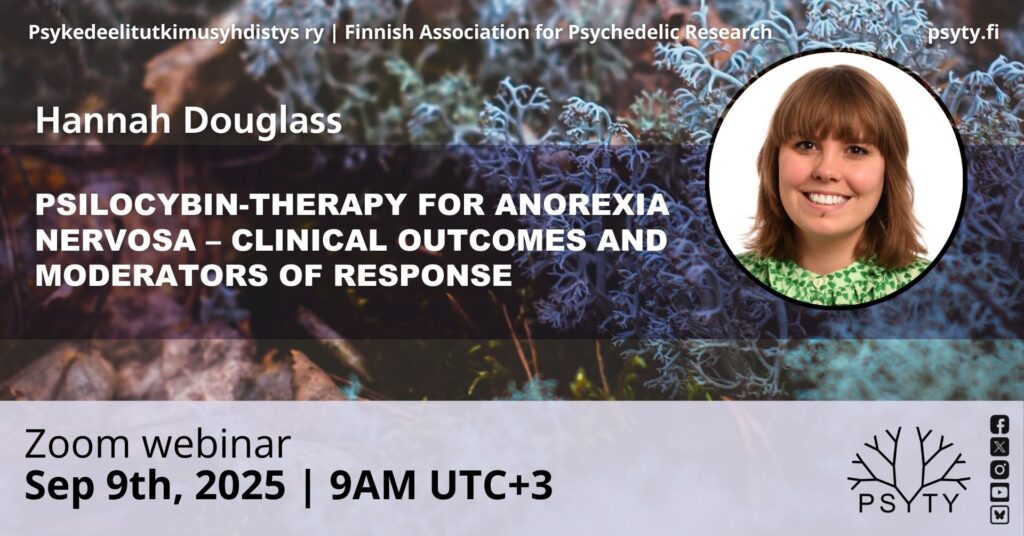
When explaining the therapeutic effects of psychedelics, their potential for facilitating changes in deeply ingrained patterns of thought and behaviour is often mentioned as a key ingredient. This is part of the rationale for why there’s increasing interest in investigating whether psychedelics can be useful for treating eating disorders.
In our next webinar lecture, held on Tuesday September 9th at 9AM UTC+3, postdoc researcher Hannah Douglass will outline the existing evidence for the use of psychedelics therapeutically in the treatment of eating disorders, and explore the findings of her PhD work. Specifically, the lecture will focus on whether psilocybin was a safe and feasible intervention in women with anorexia nervosa, whether it was therapeutically beneficial, and the moderators of this response.
The event contains a Q&A section and the total length is 2 hours. Please note the atypical starting time for the webinar – our lecturer resides in New Zealand, which in Finnish time means that we’ll be starting at nine in the morning!
We offer this webinar as a pay what you can event: you can participate without paying, but by paying, you can help us produce more events like this and ensure that we can keep offering them to people regardless of their financial circumstances.
0 € – register here
5–20 € – buy ticket here
If you pay for the ticket, please also remember to register for the webinar via the registration link!
You can also support us by paying our membership fee for 2025. You’ll find our membership products on the main page of our web store. We also accept donations.
About the speaker:
Dr Hannah Douglass is a Postdoctoral Fellow at the University of Auckland where she is working on an LSD microdosing study for mild-moderate depression. She also holds an Honorary Research Associate role at Imperial College London, where she is finalising her doctoral work investigating psilocybin as a treatment for adult females with anorexia nervosa. Hannah is particularly interested in the potential effects of psychedelics on eating behaviours and body dissatisfaction in women’s health conditions and the potential for these compounds to induce neuroplasticity, which she plans to explore further with her team in Auckland.
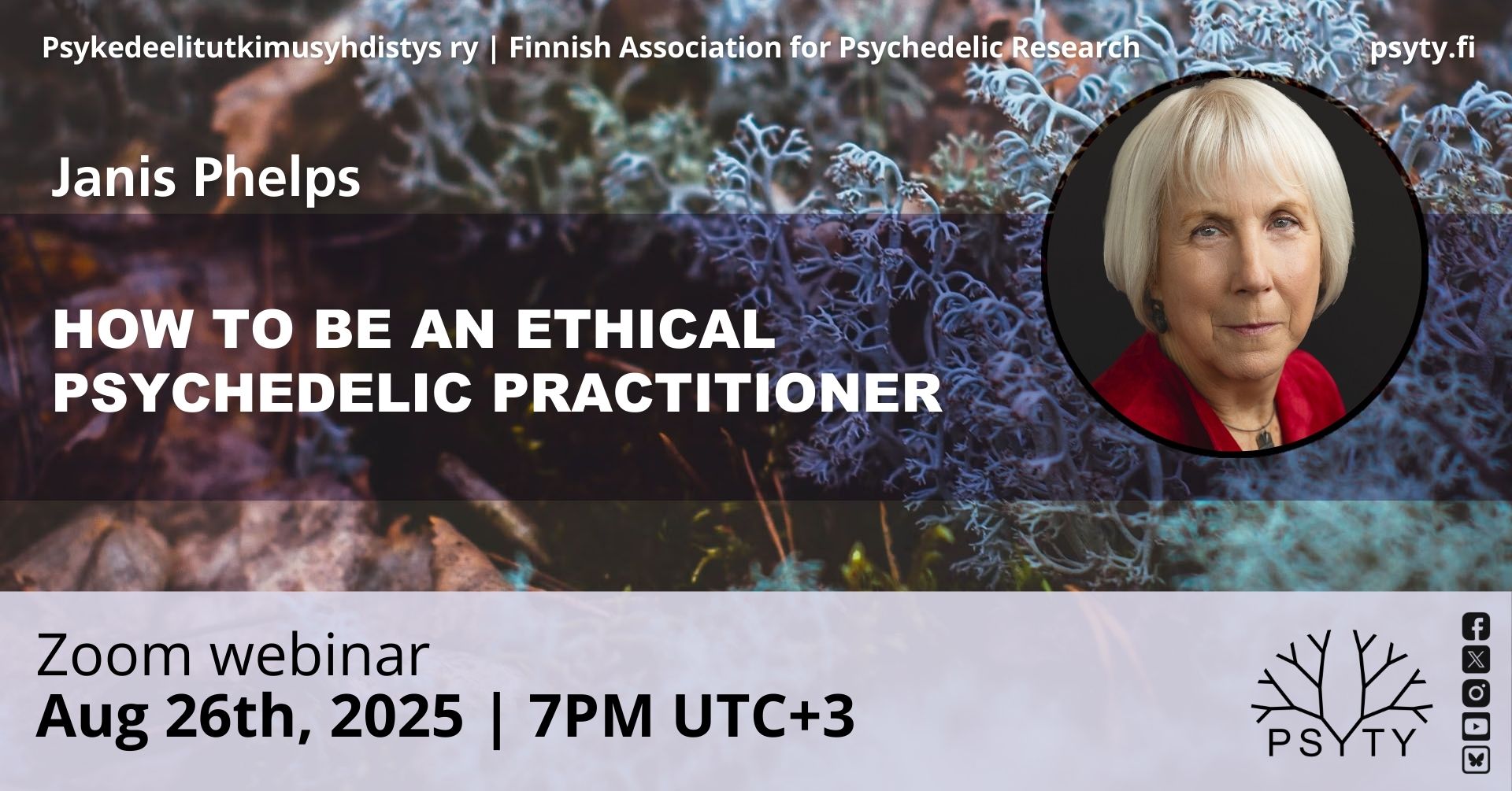
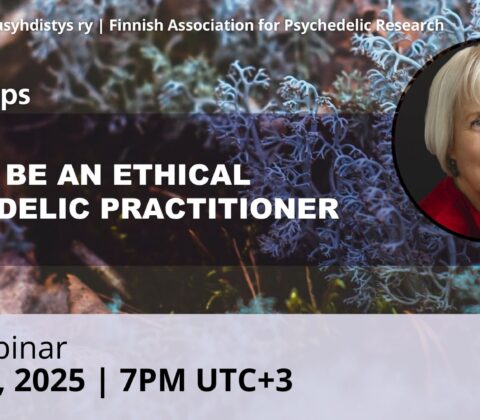
Webinar August 26th 2025 Janis Phelps: How to be an ethical psychedelic practitioner
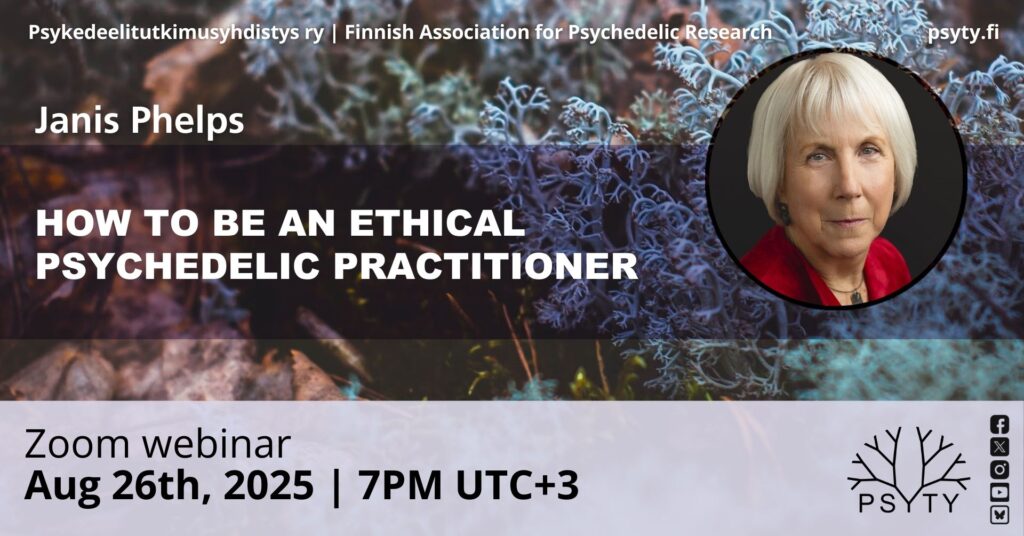
What are the most important qualities and skills of someone aspiring to be an ethical psychedelic therapist? Next Tuesday, August 26th at 7PM UTC+3, we’ll investigate this question in a webinar lecture with a pioneer in psychedelic therapist training, psychologist Janis Phelps, PhD.
There are many important areas of being an ethical psychedelic therapist. Inner elements include humility, an abiding emphatic presence, a commitment to a life of honest self-reflection and the ability to take care of oneself and one’s needs. From the point of view of therapeutic practice and interaction, skills in maintaining a consistently safe set and setting, cultural competency and careful delivery of informed consent and consent practices are all relevant. Professional elements include professional transparency, a commitment to peer supervision and the improvement of professional institutions.
The webinar is aimed for professionals and students of psychotherapy and other clinical fields, but also for anyone interested in learning more about the aspects of ethical psychedelic therapy.
The event contains a Q&A section and the total length is 2 hours. Please note the atypical starting time for the webinar!
We offer this webinar as a pay what you can event: you can participate without paying, but by paying, you can help us produce more events like this and ensure that we can keep offering them to people regardless of their financial circumstances.
0 € – register here
5–20 € – buy ticket here
If you pay for the ticket, please also remember to register for the webinar via the registration link!
You can also support us by paying our membership fee for 2025. You’ll find our membership products on the main page of our web store. We also accept donations.
About the speaker:
Janis Phelps, PhD, is a leader in the field of psychedelic therapy training as the Director of the Psychedelic Therapies and Research at the California Institute of Integral Studies Center. As the Center’s founder, Dr. Phelps developed and launched the first university accredited, post- graduate training program for psychedelic therapy and research. She has held the position of the Dean of Faculty of the six doctoral departments in the CIIS School of Humanities and Social Sciences. Her landmark 2017 publication, “Developing Guidelines and Competencies for the Training of Psychedelic Therapists”, has garnered 6,000+ reads which is a testament to the interest in training worldwide. These ideas are further developed in two book chapters and other journal publications. A licensed clinical psychologist, Dr. Phelps is a board member of the Heffter Research Institute, which has conducted highly influential psilocybin-assisted psychotherapy research since the 1990’s. She consults internationally and presents on methods of scaling effective training programs to meet the burgeoning need for well-trained facilitators and therapists in the field of psychedelic medicine. Dr. Phelps maintains a private clinical practice in California.
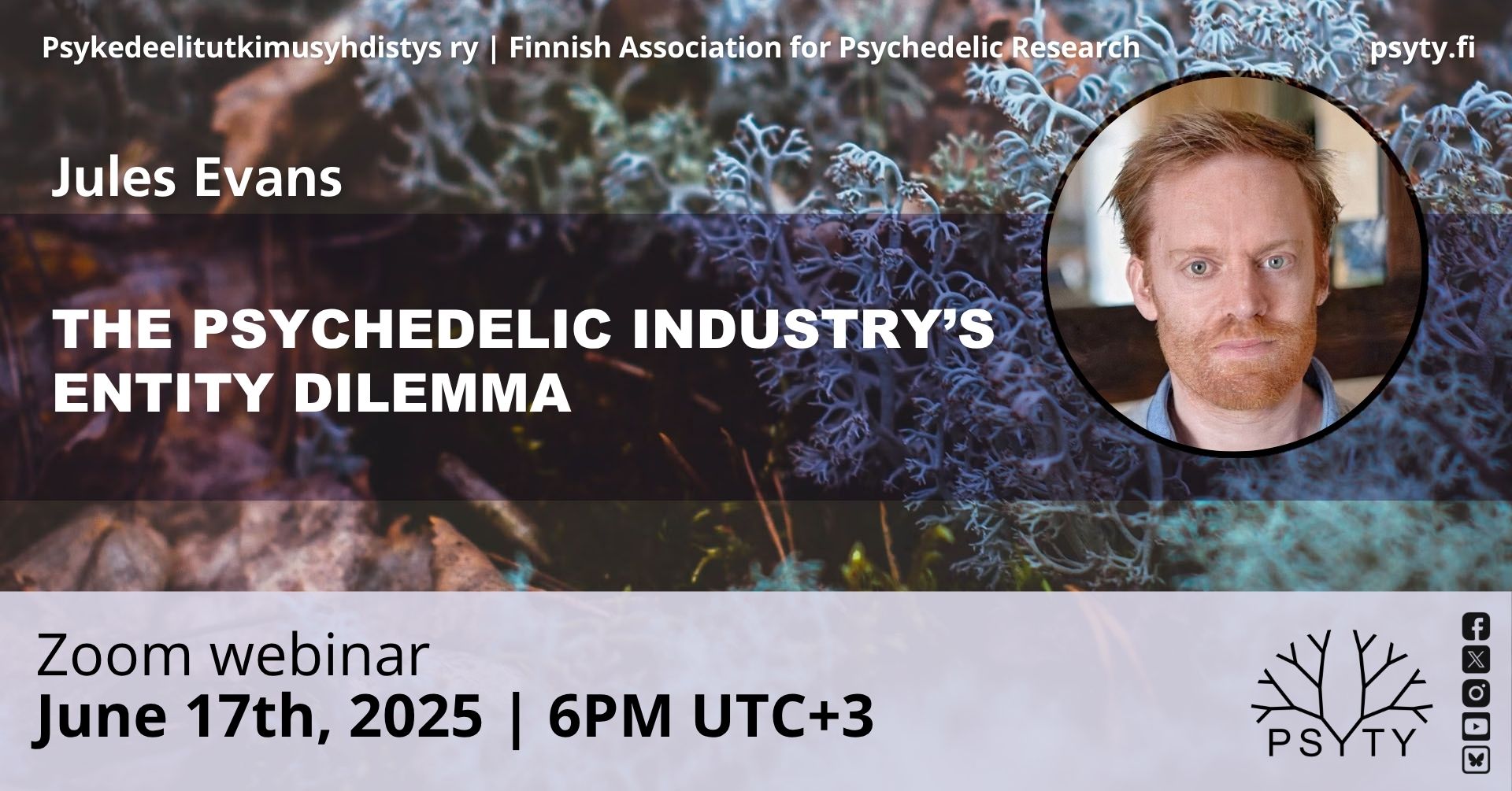
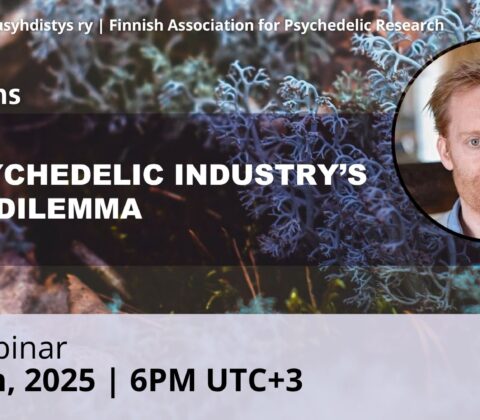
Webinar June 17th 2025 Jules Evans: The Psychedelic Industry’s Entity Dilemma
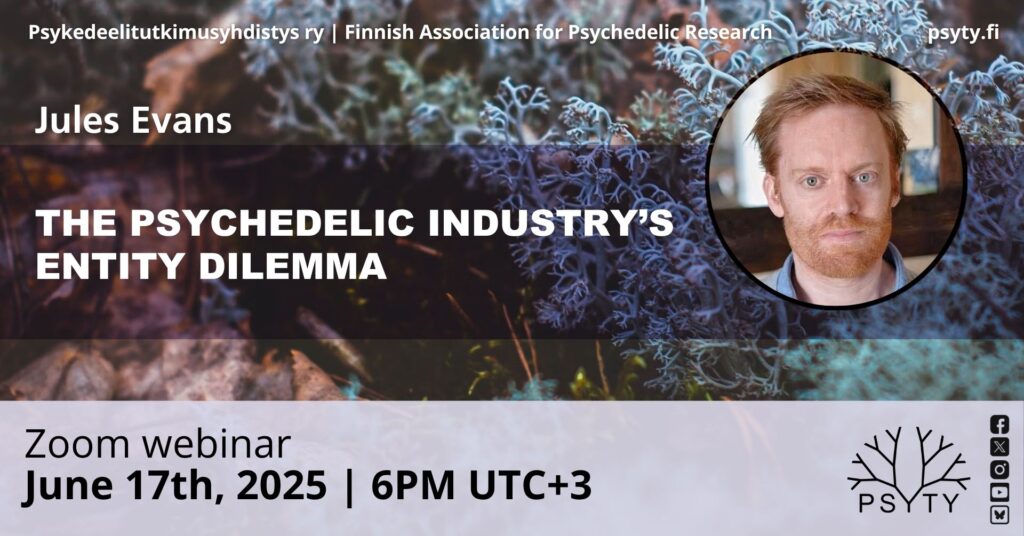
Sometimes, even quite often, people encounter ‘entities’ on psychedelics, which may give them messages, heal them or sometimes seem to threaten them or cause them harm. This presents a dilemma for the budding psychedelic therapy industry and the related field of research regarding informed consent. Don’t mention the entities, and people might express ontological shock at encountering them. Do mention the entities, and people and regulators might very well be put off and not take the field seriously, or even see it as spiritually dangerous.
But precisely what sort of entity encounters do people report? What different attitudes to these experiences has the psychedelic therapy field taken? And what might be a wise approach to this topic, for therapists, guides and industry figures? On Tuesday June 17th at 6PM (UTC+3), we’ll dig into these questions in a webinar lecture by Jules Evans, philosopher, historian and director of the Challenging Psychedelic Experiences Project.
The event contains a Q&A section and the total length is 2 hours.
We offer this webinar as a pay what you can event: you can participate without paying, but by paying, you can help us produce more events like this and ensure that we can keep offering them to people regardless of their financial circumstances.
0 € – register here
5–20 € – buy ticket here
If you pay for the ticket, please also remember to register for the webinar via the registration link!
You can also support us by paying our membership fee for 2025. You’ll find our membership products on the main page of our web store. We also accept donations.
About the speaker:
Jules Evans is the director of the Challenging Psychedelic Experiences Project, a non-profit which researches post-psychedelic difficulties and what helps people cope with them. He is also the editor of Ecstatic Integration, a popular substack exploring psychedelic and ecstatic integration. He is an honorary research fellow at the Centre for the History of the Emotions at Queen Mary, University of London. He’s the author / co-author of four books, including Philosophy for Life and Other Dangerous Situations (2012), The Art of Losing Control (2017) and Breaking Open: Finding a Way Through Spiritual Emergency (2020). He has written and presented for publications including The Times, Economist, Spectator, Financial Times, BBC Radio 4, Audible and Aeon, and he was a BBC New Generation Thinker.
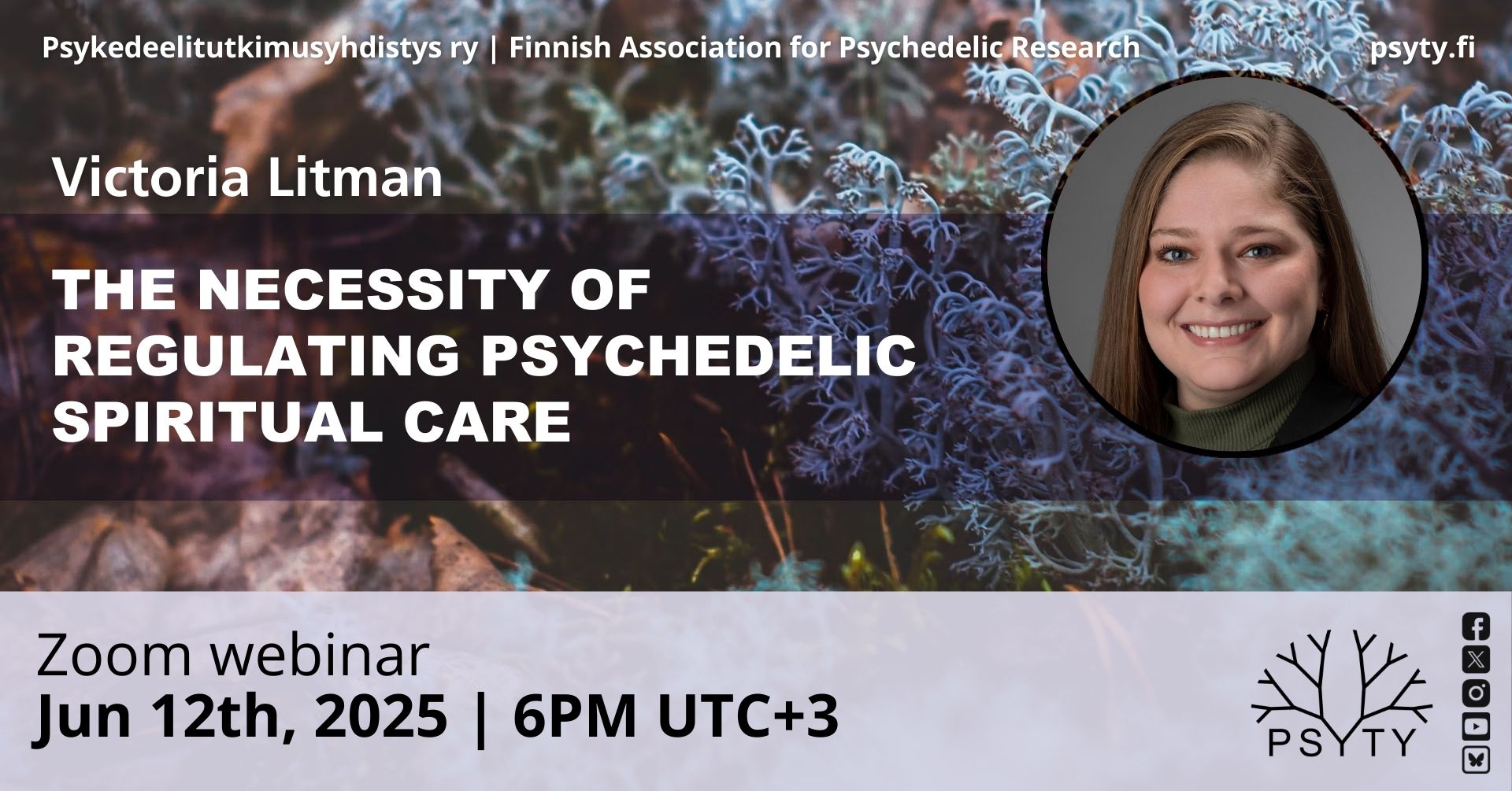
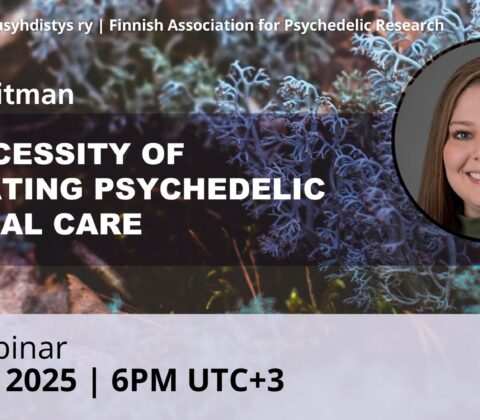
Webinar June 12th 2025 Victoria Litman: The Necessity of Regulating Psychedelic Spiritual Care
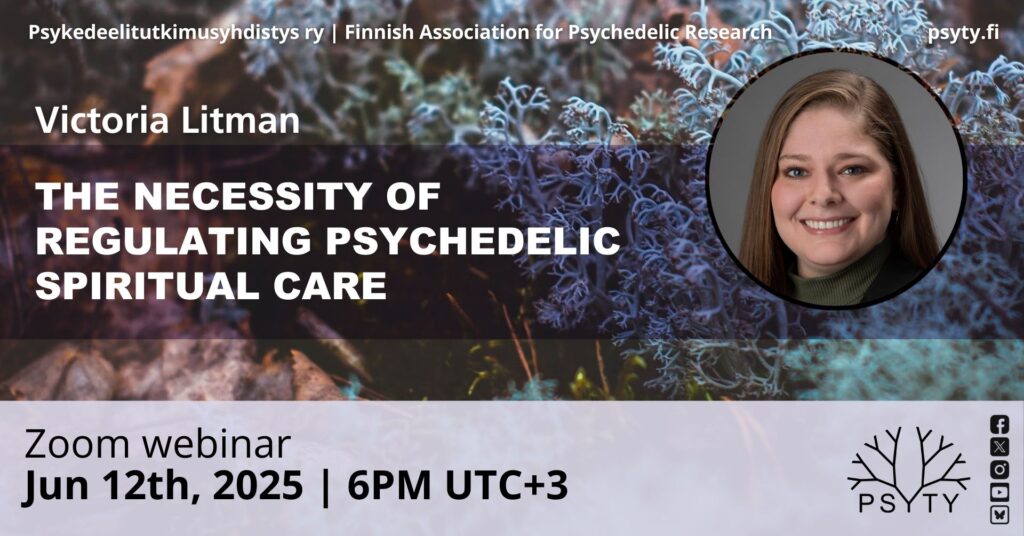
Spiritual or religious elements are a relevant part of the effects of psychedelics. Some people have argued that in addition to the more typical mental health professionals, psychedelic care also needs people who focus on the aforementioned elements – what has been called psychedelic chaplains.
One of the people who has been calling for such an approach is lawyer, law professor, and interdisciplinary psychedelic studies scholar Victoria Litman. In a webinar presentation organized by the Finnish Association for Psychedelic Research on Tuesday June 12th, she will argue that it is ethically necessary to include spiritual care due to the enhanced suggestibility of individuals under the influence of psychedelics. This suggestibility creates a situation ripe for imposition, whether intentional or accidental, of spiritual or religious ideas, which there have already been allegations of. Her view is that ethical psychedelic facilitation requires accounting for this possibility and actively working to prevent it.
Litman sees psychedelic chaplains as playing an important role in informed consent processes, training medical professionals and holding space for participants during psychedelic experiences and helping them integrate those experiences. She argues that including psychedelic chaplains may enhance therapeutic benefits through supporting continued communal engagement after psychedelic sessions. She also brings up an economic perspective: The high cost of providing medical professionals for long periods of time is one of the biggest financial barriers to expanding access to psychedelic treatments.
The event contains a Q&A section and the total length is 1,5 hours.
We offer this webinar as a pay what you can event: you can participate without paying, but by paying, you can help us produce more events like this and ensure that we can keep offering them to people regardless of their financial circumstances.
0 € – register here
5 € – buy ticket here
10 € – buy ticket here
20 € – buy ticket here
If you pay for the ticket, please also remember to register for the webinar via the registration link!
You can also support us by paying our membership fee for 2025. You’ll find our membership products on the main page of our web store. We also accept donations.
Victoria Litman M.Div., J.D., LL.M. is a visiting professor at Roger Williams University School of Law, where she teaches Torts, Cannabis Law, and Psychedelics Law. She is also a Fellow in Psychedelic Law and Spirituality at Harvard Law School’s Petrie-Flom Center for Health Law Policy, Biotechnology, and Bioethics. Her scholarly work focuses on the intersections of tax law, religious freedom, and emerging areas such as cannabis and psychedelics law.
Professor Litman earned an LL.M. in Taxation with Distinction from Georgetown University Law Center during which she was a Graduate Tax Scholar, a JD (cum laude) from New York Law School, a Master of Divinity from Union Theological Seminary (concentration in Religion and Law), and a BA in Religion from the University of Southern California.
